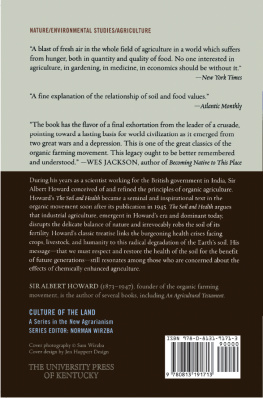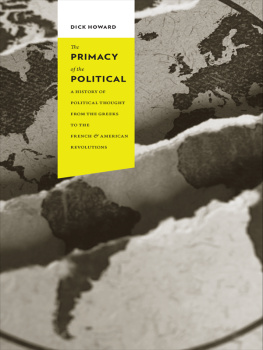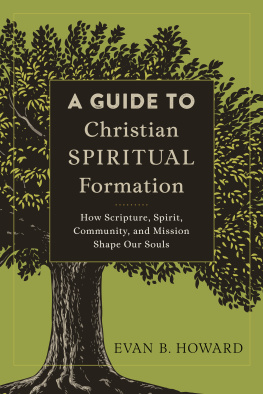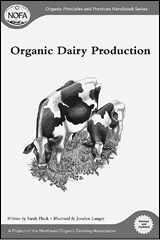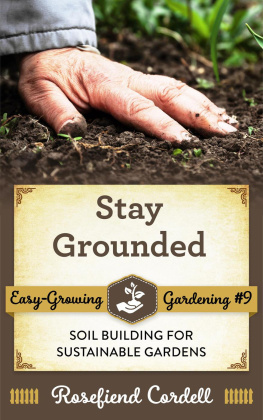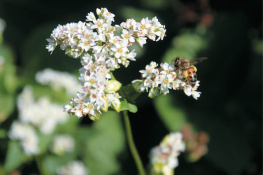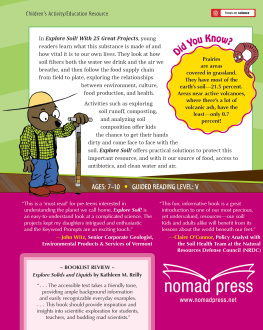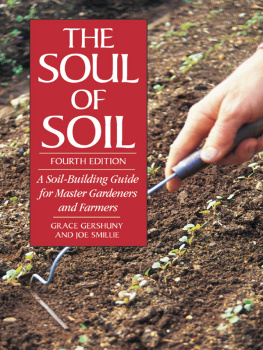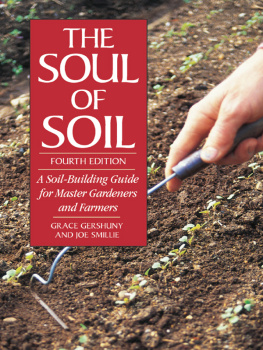The Soil and Health
Culture of the Land
A Series in the New Agrarianism
This series is devoted to the exploration and articulation of a new agrarianism that considers the health of habitats and human communities together. It is intended to demonstrate how agi arian insights and responsibilities can be worked out in diverse fields of learning and living: history, science, art, politics, economics, literature, philosophy, religion, urban planning, education, and public policy. Agrarianism is a comprehensive worldview that appreciates the intimate and practical connections which exist between humans and the earth. It stands as our most promising alternative to the unsustainable and destructive ways of current global, industrial, and consumer culture.
Series Editor
Norman Wirzba, Georgetown College, Kentucky
Advisory Board
Wendell Berry, Port Royal, Kentucky
Ellen Davis, Duke University, North Carolina
Patrick Holden, Soil Association, United Kingdom
Wes Jackson, Land Institute, Kansas
Gene Logsdon, Upper Sandusky, Ohio
Bill McKibben, Middlebury College, Vermont
David Orr, Oberlin College, Ohio
Michael Pollan, University of California at Berkeley, California
Jennifer Sahn, Orion magazine, Massachusetts
Vandana Shiva, Research Foundation for Science, Technology and Ecology, India
William Vitek, Clarkson University, New York

Publication of this volume was made possible in part by a grant from the National Endowment for the Humanities.
Copyright 1947 by The Devin-Adair Company
New Introduction copyright 2006 by Wendell Berry
Published in 2006 by The University Press of Kentucky
Scholarly publisher for the Commonwealth,
serving Bellarmine University, Berea College, Centre College of Kentucky,
Eastern Kentucky University, The Filson Historical Society, Georgetown
College, Kentucky Historical Society, Kentucky
State University, Morehead State University, Murray State University, Northern Kentucky University,
Transylvania University, University of Kentucky, University of Louisville,
and Western Kentucky University.
All rights reserved.
Editorial and Sales Offices: The University Press of Kentucky
663 South Limestone Street, Lexington, Kentucky 40508-4008
www.kentuckypress.com
Library of Congress Cataloging-in-Publication Data
Howard, Albert, Sir, 1873-1947.
The soil and health : a study of organic agriculture / Sir Albert Howard.
p. cm. (Culture of the land: a series in the new agrarianism)
Originally published in 1947 by The Devin-Adair Company.
Includes bibliographical references and index.
ISBN-13: 978-0-8131-9171-3 (pbk. : alk. paper)
ISBN-10: 0-8131-9171-8 (pbk. : alk. paper)
1. Organic farming. 2. Organic gardening. 3. Plant diseases.
I. Title. II. Series.
S605.5.H67 2007
631.584-dc22 2006025168
This book is printed on acid-free recycled paper meeting
the requirements of the American National Standard
for Permanence in Paper for Printed Library Materials.

Manufactured in the United States of America.

Member of the Association of
American University Presses
The civilized nationsGreece, Rome, England
have been sustained by the primitive forests which
anciently rotted where they stood. They survive as
long as the soil is not exhausted.
Thoreau, Walking and the Wild
The staple foods may not contain the same
nutritive substances as in former times.
Chemical fertilizers, by increasing the abundance
of the crops without replacing all the exhausted
elements of the soil, have indirectly contributed to
change the nutritive value of cereal grains and of,
vegetables. Hygienists have not paid sufficient
attention to the genesis of diseases. Their studies
of conditions of life and diet, and of their effects
on the physiological and mental state of modern
man, are superficial, incomplete, and of too short
duration. They have, thus, contributed to the
weakening of our body and our soul.
Alexis Carrel, Man the Unknown
The preservation of fertility is the first duty of
all that live by the land. There is only one rule
of good husbandryleave the land far better than
you found it.
George Henderson, The Farming Ladder
ILLUSTRATIONS
PLATES
FIGURES
NEW INTRODUCTION
In 1964 my wife, Tanya, and I bought a rough and neglected little farm on which we intended to grow as much of our own food as we could. My editor at the time was Dan Wickenden, who was an organic gardener and whose father, Leonard Wickenden, had written a practical and inspiring book, Gardening with Nature, which I bought and read. Tanya and I wanted to raise our own food because we liked the idea of being independent to that extent, and because we did not like the toxicity, expensiveness, and wastefulness of modern food production. Gardening with Nature was written for people like us, and it helped us to see that what we wanted to do was possible. I asked Dan where his fathers ideas had come from, and he gave me the name of Sir Albert Howard. My reading of Howard, which began at that time, has never stopped, for I have returned again and again to his work and his thought. I have been aware of his influence in virtually everything I have done, and I dont expect to graduate from it. That is because his way of dealing with the subject of agriculture is also a way of dealing with the subject of life in this world. His thought is systematic, coherent, and inexhaustible.
Sir Albert Howard was born in 1873 to a farming family in Shropshire, and he died in 1947. He published several books and also many articles in agricultural journals. His best-known books, An Agricultural Testament (1940) and The Soil and Health (1947), were addressed both to general readers and to his fellow scientists.
An Agricultural Testament and The Soil and Health are products of Howards many years as a government scientist in India, during which he conceived, and set upon sound scientific footing, the kind of agriculture to which his followers have applied the term organic. But by 1940, when the first of these books was published, the industrialization of agriculture had already begun. By 1947, when The Soil and Health was published, World War II had proved the effectiveness of the mechanical and chemical technology that in the coming decades would radically alter both the practice of agriculture and its underlying assumptions.
This revolution marginalized Howards work and the kind of agriculture he advocated. So-called organic agriculture survived only on the margin. It was practiced by some farmers of admirable independence and good sense and also by some authentic nuts. In the hands of the better practitioners, it was proven to be a healthful, productive, and economical way of farming. But while millions of their clients spent themselves into bankruptcy on industrial supplies, the evangelists of industrial agriculture in government and the universities ignored the example of the successful organic farmers, just as they ignored the equally successful example of Amish farming.
Meanwhile, Howards thought, as manifested by the organic movement, was seriously oversimplified. As it was understood and prescribed, organic agriculture improved the health of crops by building humus in the soil, and it abstained from the use of toxic chemicals. There is nothing objectionable about this kind of agriculture, so far as it goes, but it does not go far enough. It does not conceive of farms in terms of their biological and economic structure, because it does not connect farming with its ecological and social contexts. Under the current and now official definition of organic farming, it is possible to have a huge organic farm that grows only one or two crops, has no animals or pastures, is entirely dependent on industrial technology and economics, and imports all its fertility and energy. It was precisely this sort of specialization and oversimplification that Sir Albert Howard worked and wrote against all his life.
Next page
